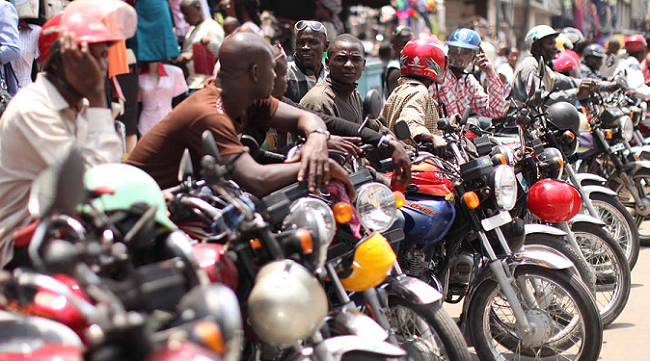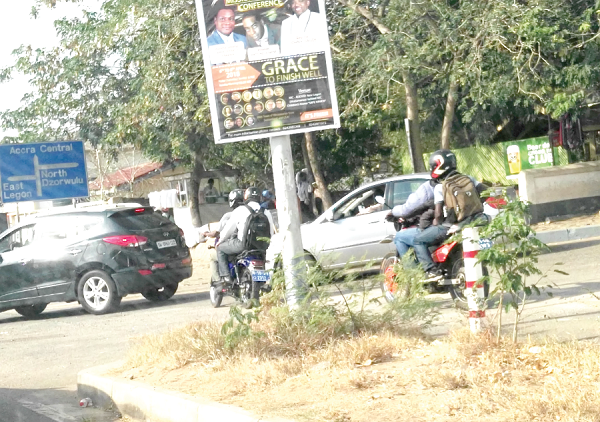
Growing ‘Okada’ business; Time to act is now
Commercial motorcycle riders, popularly known as ‘okada’ riders, are having a field day in the national capital, Accra where heavy vehicular traffic is common. The traffic starts right from the morning, normally referred to as the ‘rush hour’ when most commuters leave home to transact their businesses. It is the same from 5 p.m. when most commuters are returning home after a hard day’s work.
The situation has become so intense that most commuters, who hitherto dreaded to use okada as a means of transport, have resorted to its use.
Advertisement
Now, commuters pick okada from one bus stop to another just to avoid the heavy traffic and then continue via public vehicles to their destination.
Checks by the Daily Graphic revealed that some commuters from suburbs such as Adentan and Madina heading to town or the central business district of Accra sit in commercial buses (trotro) up to Okponglo (Legon bus stop) and continue their journey by okada to Shiashie bus stop at GH¢5.
During the day, many okada riders ply their trade around the Kingsway bus stop near Accra central, where they pick passengers to any destination of choice.
Schoolchildren, formal and informal workers all use okada to get to their destination on time.
The okada riders are, however, not able to operate at the main transport stations in the city due to fierce opposition from the trotro and taxi drivers and their unions.
How lucrative
Some okada riders the paper spoke to said they earn between GH¢50 and GH¢200 a day, an average of GH¢20,000 annually.
Mr Kweku Gyimah pointed out that he made an average of GH¢250 a week and over GH¢15,000 annually depending on the market.
He noted that from Mallam junction to Accra central, he charged GH¢12, which most people were willing to pay considering the heavy traffic in the city currently.
A commuter, Mr Daniel Anim, said an okada ride from Kaneshie to Amasaman cost GH¢25, while Ms Lois Darkoah said a ride from Kanda to Tudu cost GH¢15.
“Motorcycle is the cheapest and fastest means of transportation though there is risk involved due to speeding,” she added.
Their ordeal
The okada business has a bad image in Ghana due to people’s experiences with their operations.
Okada riders in Accra have raised concern about persistent attacks from some personnel of the Ghana Police Service.
The acting Spokesperson of the commercial motorcycle riders, Mr Dennis Nsobila, bemoaned the rate of extortion from some police officers despite providing valid documents such as licence, insurance and protective materials upon request.
“After we have given them everything they ask for, they will still have issues with us and take some amount of money between GH¢20 and GH¢100 anytime they stop us. We don’t even know what the police use those monies for,” he stated.
While admitting that there were bad lots among them, he said it was unfortunate that they were always associated with social vices such as armed robbery.
“Some of us are into genuine business. I will caution unscrupulous riders who engage in such acts of robbery to desist and not tarnish our image,” he added.
He indicated that any initiative by the government to regularise their operations would be supported by them.

Call for legalisation
According to Mr Nsobila, the okada business was lucrative; therefore, authorities must implement necessary policies to enable them to legally operate in the country.
That, he said, would help solve the transport deficit and help provide employment to most of the youth who were interested in the business.
He gave an assurance that they were ready to abide by every law that the authorities would enact to allow them to operate in a conducive and orderly manner.
Mr Nsobila indicated that although the authorities did not support their activities, available data showed that eight per cent of all the motorcycles in the country were being used for commercial purposes.
The influx of motorcycles reduces traffic jams in the city and its environs. It also generates a lot of income that is used for national development through the paying of taxes.
“With what we get, we will be able to fulfil our tax obligations and take care of our families,’’ he noted.
Mr Nsobila said many of the riders wished to quit the okada business but due to the unemployment situation in the country, they had to find means of survival and “okada business is one of their options”.
A taxi driver, Mr Jeremy Aboagye, said the okada business was not affecting his business in any way; however, the challenge with the okada business was their flouting of road traffic regulations.
“We don’t consider the okada as our competitors. Most people fear okada, so they always pick taxi,” he said.
Licensing and regulation
The Deputy Director, Driver Training, Testing and Licensing at the Driver and Vehicle Licensing Authority (DVLA), Mr Kafui Semevo, in an interview on April 12, said Regulation 128 of the Road Traffic Regulations, 2012, LI 2180, prohibits the use of motorcycles and tricycles for commercial purposes.
That, according to him, sought to prevent the public from the dangers associated with the use of such modes of transportation in the highly populated urbanised communities.
“Regulation 121 sub-section states the licensing authority shall not register the motorcycle to carry fare-paying passengers; a person shall not use or permit a motorcycle or tricycle by which that person exercises control to be used for commercial purposes except for courier and delivery services; and a person shall not ride motorcycle or a tricycle for a fee or as a fare-paying passenger. Clearly, we see that the form of commercial activity expressly states that either it is used for courier or delivery purposes,” he stressed.

Enforcement challenges
Mr Semevo said there was a lapse because if two people were seen riding on a motorcycle, it was difficult to determine whether they were engaged in okada, making it difficult to enforce the law.
He cited that in Rwanda, okada was said to be properly regulated but looking at the road environment in the country, people continued to use the services of okada because of the lack of a proper structured public transport service.
Consequently, he said, owning a car had become a necessity.
“We should look at what we have and how we can modify to have the desired results because the longer we wait, the more expensive it will become. The system itself should have structured infrastructure and controls for effective public transport services,” he stated.
He noted that it was possible to create dedicated bus lanes and people would patronise.
Effects
Mr Semevo said the absence of a proper public transport system had an effect on the health of the citizenry, school children struggling to go school and workers before and after work.
“Without transport we can’t move around. Our interest is to ensure motorcycle riders and users observe all the necessary safety requirements,” he added.
The police
In an interview, the Public Relations Officer (PRO) of the Motor Traffic and Transport Department (MTTD) of the Ghana Police Service, Chief Inspector Simon Tenkuu, said the police was enforcing the law, adding that from experience and background, they believed okada was not a safe means of commercial transport.
He added that in terms of security, if people could be indisciplined by riding motorcycles without licence and having no knowledge of the road traffic issues, it was a danger to the nation.
“Let us encourage global standards instead of just reverting to what is archaic and blame it on traffic. The road transport we have, when we structure it very well like the bus rapid so that a lot of people will park their cars, will create road space,” he stated.
National Road Safety Commission (NRSC)
The Head of Communications at the NRSC, Mr Kwame Kodua Atuahene, said the issue of okada raised issues such as safety and health concerns.
He mentioned that Ghana was part of the West African Road Safety Organisation (WARSO) that met regularly, and which cautioned that Ghana had an opportunity to control the okada menace with steadfastness.
He said there were exceptions to the use of okada in some rural areas or else those areas will be cut off.
“In the case of rural areas where there are poor road networks, the people rely on motorcycles and tricycles or else they will be cut off from public transport and so those areas rely heavily on that,” he stated.
He disclosed that the motorcycle was a major cause of fatal accidents in the country and that its related casualties had increased to about 400 per cent in the last 10 years, largely since riders did not adhere to road traffic regulations.
Advocacy
Mr Atuahene alleged that the lack of political will had contributed to the okada menace facing the country, adding that there were genuine transportation concerns that all and sundry must help find solutions to.
Conclusion
Safety goes beyond being stuck in traffic. You may need okada but is it the safest way of commuting?
Motorcycles are considered as an open means of transport and so fatality rate is higher compared to closed vehicles. In neighbouring countries where the use of okada is widespread, they are trying hard to do away with them.
Security experts say okada is a fast means of vehicular travel such that criminally minded people usually love using it for their unlawful activities.
In recent times, some robbery and snatching cases have been carried out with the aid of motorcycles, some without number plates.
Most riders think they are not subject to the rules and regulations of commercial vehicle driving system, so they abuse the regulations; jump red lights even with pillions; and meander through heavy vehicular traffic, thereby exposing their passengers to grave danger.
Before anyone can ride a motorcycle, he must get licence A from the DVLA but most riders do not have any skills. To avoid injuries, essential protective clothing should include helmets, jackets, boots, gloves, spine protector / kidney belts, ear plugs, sunglasses, knee and elbow pads.
Statistics
A total of 2,839 motorcycle crashes were recorded in 2017 nationwide. From 2014 to 2016, motorcycle fatalities stood at 1,116, out of 5,722, representing 19.5 per cent.
Writer’s Email: [email protected]




